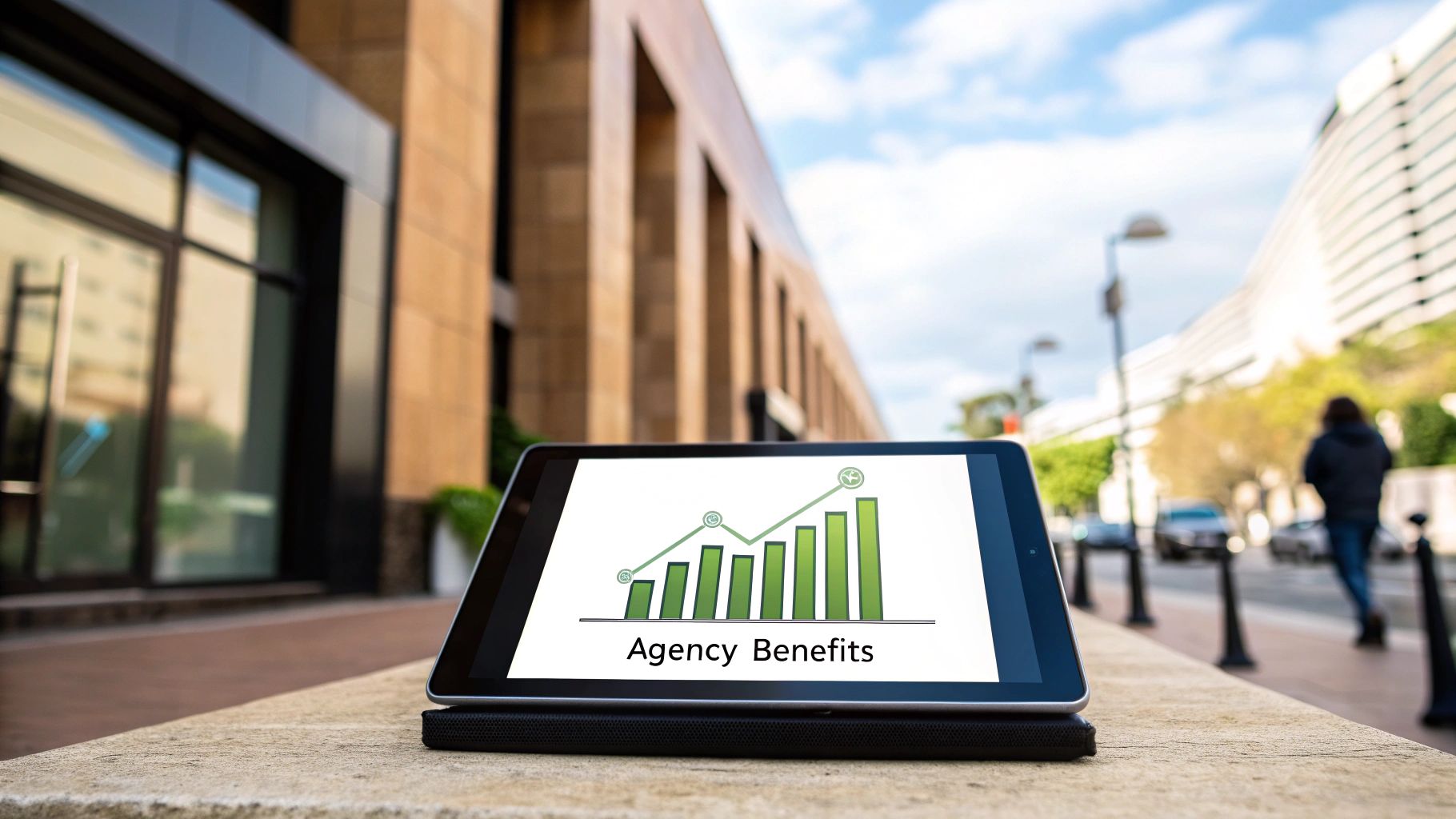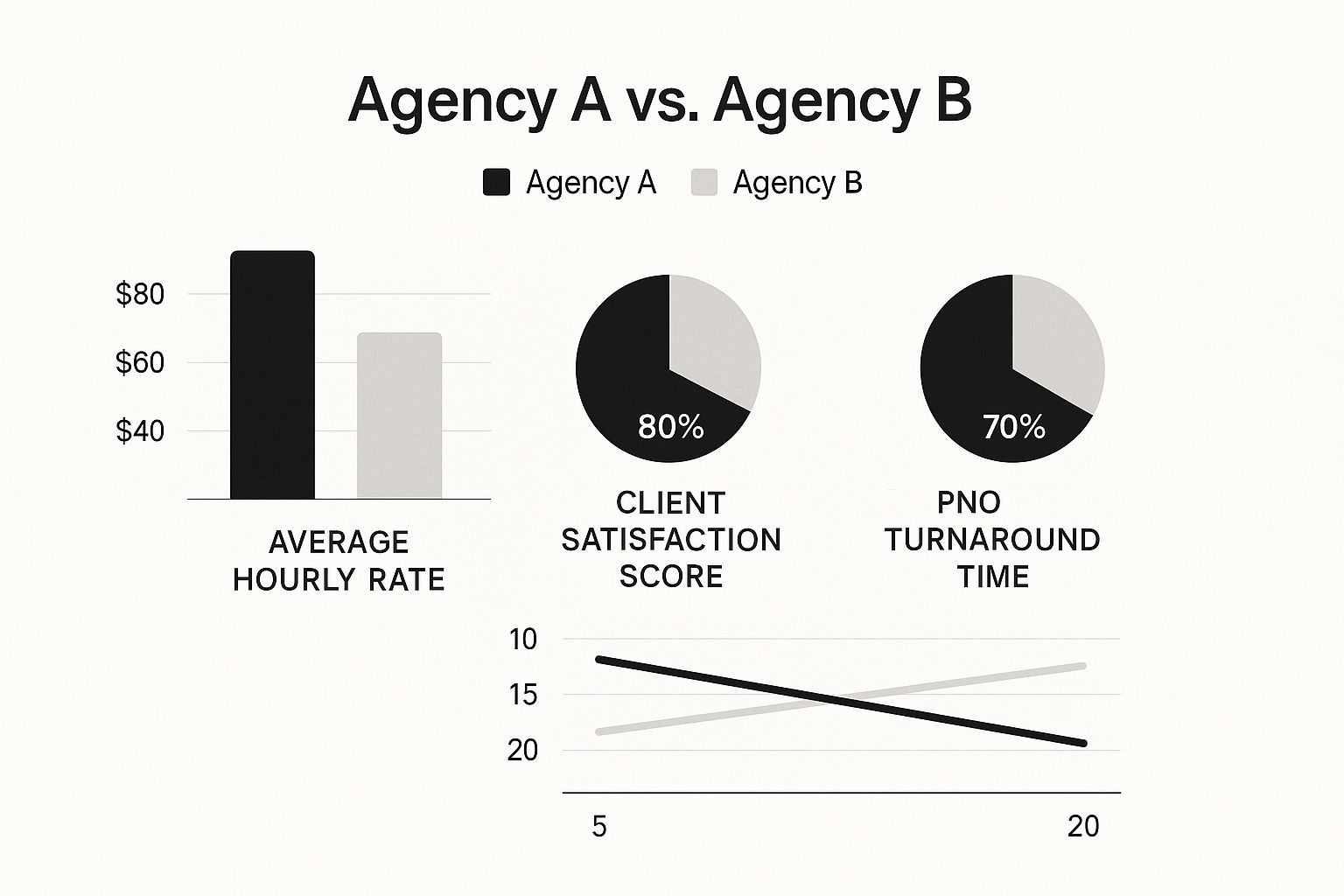Choosing a Digital Agency for E-commerce Growth
An e-commerce digital agency isn't just another vendor; they're a strategic partner laser-focused on one thing: growing your online sales and building your brand. They bring specialist expertise in the stuff that actually moves the needle—like SEO, paid ads and customer experience—which is vital if you want to be seen in an increasingly crowded market.
Why the Right E-commerce Agency Is a Game Changer
Let's be blunt. In the UK's e-commerce scene a great product just doesn't cut it anymore. Not on its own.
Success now hinges on visibility, genuine customer engagement and creating a digital experience so smooth it feels effortless. This is exactly where a specialist agency stops being a 'nice to have' and becomes a core part of your business strategy. They bring a fresh, outside perspective and a depth of industry knowledge that's tough to replicate with an in house team alone.
A truly great partner acts as a genuine extension of your team. They go way beyond just managing campaigns. They offer strategic direction because they’ve taken the time to understand the quirks of your target audience and the unique challenges of your market niche, whether you’re selling high fashion, niche electronics or handmade crafts. Their job is to build a powerful online presence that doesn't just attract visitors but turns them into loyal customers.
The Real Cost of a Poor Choice
Picking the wrong agency or trying to juggle it all yourself can be an expensive mistake. Wasted ad spend is the obvious one but the hidden costs are what really sting. Think about the missed growth opportunities in a market where customer habits can shift overnight. That can set your brand back months, if not years.
Without expert guidance, you’re at risk of falling behind competitors who are already using data and technology to their advantage. The online marketplace never stands still and a bad partnership is a fast track to stagnation.
A truly effective digital agency for e-commerce doesn't just tick boxes. They challenge your assumptions, bring fresh ideas to the table and hold themselves accountable for delivering measurable results that actually impact your bottom line.
Investing in Specialised Expertise
One of the biggest reasons to bring in an e-commerce agency is their skill in executing advanced digital marketing strategies for maximising ROI , which can be a complete game changer for your brand. This specialist knowledge usually covers a few key areas:
- Search Engine Optimisation (SEO): Making sure your products pop up at the top of search results the moment a potential customer is ready to buy.
- Paid Media Management: Building and fine-tuning ad campaigns across platforms like Google and social media to drive immediate, high-quality traffic and sales.
- Customer Experience (CX): Smoothing out your website's usability and checkout process to slash cart abandonment rates and build the kind of loyalty that keeps people coming back.
The UK's digital marketing sector is booming, driven by this very demand. Projections show the market value is expected to jump from $30.14 billion USD in 2024 to a staggering $86.35 billion USD by 2034.
This explosive growth just highlights how critical expert marketing has become. To get a better sense of the direct advantages, you can explore the benefits of outsourcing your marketing to a digital agency. Ultimately this decision isn't just about outsourcing tasks; it's about investing in your brand's future.
Defining What Success Looks Like for Your Brand

Before you even think about searching for a digital agency, you need to get brutally honest about what you actually want to achieve. It’s a simple truth but one that’s often missed. Without a clear destination, how can you possibly pick the right vehicle to get you there?
A vague goal like 'more sales' isn't a strategy. It's a wish.
To find a partner who can genuinely move the needle, you have to translate those broad ambitions into something solid. What does ‘success’ really mean for your business right now ? Is it about raw sales figures? Building brand recognition? Or maybe it's about improving customer loyalty to drive that all-important repeat business?
Each of these goals requires a completely different approach from an agency. The UK agency sector has grown right alongside the e-commerce boom for this very reason brands need specialist support to hit specific targets. Recent data shows e-commerce brands are laser-focused on increasing sales revenue ( 54% ), boosting brand awareness ( 42% ) and improving customer engagement ( 42% ). You can actually see the agency market's real time growth in action.
From Vague Ideas to Specific KPIs
Right, this is where the real work begins. You need to turn those high level goals into specific, measurable Key Performance Indicators (KPIs). This is the language that any results focused e-commerce agency speaks. It creates a clear benchmark and removes any and all ambiguity about what you expect them to deliver.
For instance, instead of just saying 'we want more traffic', your goal becomes 'increase organic traffic by 20% within six months'.
See the difference? This simple shift is powerful because it's measurable and time bound. A good agency can look at that and immediately tell you if it's realistic and what it will take to get there.
Think about translating your goals like this:
- Vague Goal: 'Boost our brand'.
- Specific KPI: Increase social media engagement rate by 15% and branded search volume by 25% over the next quarter.
- Vague Goal: 'Sell more products'.
- Specific KPI: Achieve a 10% increase in average order value (AOV) and reduce shopping cart abandonment by 5% in the next three months.
This process helps you connect what you want to achieve with the specific actions an agency will take. Here's a quick table to help you map your own goals to tangible deliverables.
Translating Business Goals into Agency Deliverables
| Your Business Goal | Required Agency Service | Key Performance Indicator (KPI) |
|---|---|---|
| Increase overall revenue | Conversion Rate Optimisation (CRO) | Improve site-wide conversion rate by 1.5% |
| Grow brand awareness | Content Marketing & SEO | Increase non-branded organic traffic by 30% YoY |
| Improve customer retention | Email & SMS Marketing | Increase repeat customer rate from 20% to 25% |
| Drive qualified traffic | Paid Social Media Advertising | Achieve a Return on Ad Spend (ROAS) of 4:1 |
| Boost user engagement | Social Media Management | Increase average post engagement rate by 2% |
Defining these KPIs before you start your search is a non-negotiable step. It lets you create a detailed brief that will attract partners who are a genuine fit for your needs.
By clearly defining what success looks like on your terms, you set the foundation for a partnership built on mutual understanding and measurable results. It’s the single most important thing you can do to avoid wasted time and money.
Building Your Agency Brief
Your brief is the core document for this entire process. It should be a clear, concise summary of your business, your audience and your ambitions. A strong brief not only helps agencies understand if they're the right fit but it also forces you to clarify your own thinking.
Make sure you include details about your target customers, their pain points and what makes your products unique. And don't be shy about your budget. Being transparent saves everyone a huge amount of time and ensures the proposals you get back are actually realistic for what you can invest.
This prep work is the absolute foundation of a successful partnership. Nail this and you’re already halfway there.
Finding and Shortlisting Potential Partners

With your detailed brief in hand, you're ready to start the hunt. This isn’t about a quick Google search. The goal here is to build a solid shortlist of three to five agencies that genuinely have the expertise to deliver on what you need.
Starting broad is fine but the real work is in digging deeper. You have to look past the slick homepages and find hard evidence of real-world results. This is where you separate the real contenders from the pretenders.
Where to Look Beyond a Simple Search
Your search needs to go beyond the usual channels and into industry-specific spaces where reputable agencies prove their worth. This approach helps you find partners who are already vetted by their peers and clients, giving you an initial layer of trust before you even make contact.
A few reliable sources include:
- Industry Directories: Platforms like Clutch or The Drum Recommends are goldmines for verified client reviews and detailed agency profiles. They offer unfiltered feedback on project management, communication and most importantly, results.
- Professional Networks: LinkedIn is an excellent resource. You can see which agencies your industry connections follow or work with. It's also great for searching for specialists in e-commerce marketing right in your region.
- Client Testimonials and Case Studies: This is where the proof is. Don't just scan the glowing quotes; dive into detailed case studies that lay out the problem, the strategy and the measurable outcomes.
How to Critically Analyse Agency Portfolios
When you review an agency's work, you need to put on your detective hat. A pretty website is one thing but proven success in your specific niche is what truly matters. If you sell high-end fashion, a portfolio packed with automotive clients might not be the best fit.
The key is to analyse their case studies with a critical eye. Do their wins line up with the KPIs you’ve already defined? You can explore a diverse digital agency portfolio to see how different projects are presented and what kind of results get the spotlight. Look for agencies that proudly display their data and can draw a straight line from their actions to their client's growth.
A strong case study should tell a clear story. It should present the initial challenge, explain the strategic solution and back it all up with hard numbers—like percentage increases in revenue or return on ad spend.
Key Questions for Your Initial Review
As you browse websites and portfolios, keep a checklist of questions handy. This helps you assess each potential agency consistently and compare them on a like-for-like basis.
Your initial vetting should answer these fundamental questions:
- Which e-commerce platforms do they specialise in? Experience with Shopify is very different from Magento or a custom build. Make sure their technical skills match your setup.
- Do they have experience with businesses of your size? An agency that typically works with enterprise-level clients might not be the right cultural or financial fit for a startup and vice versa.
- What is the scope of their services? Are you looking for a specialist SEO provider or do you need a full-service partner who can handle everything from paid ads to email marketing?
This disciplined approach ensures the agencies that make your shortlist aren't just impressive on paper. They'll be a genuine strategic fit for your brand's unique needs and future ambitions.
Key Questions for Your Discovery Calls
You’ve got your shortlist. Now the real work begins. The discovery call is so much more than a simple Q&A session; it’s your first genuine peek behind the curtain into an agency’s strategic mind, their communication style and crucially, their cultural fit.
This is where you push past the glossy case studies and get a proper feel for the people you could be working with day in, day out. You need to show up prepared with questions that dig deeper than the surface to get to the heart of how they operate. Remember, a great digital agency for e-commerce will be just as interested in qualifying you as you are in qualifying them.
Gaging Their Strategic Approach
Your main goal here is to figure out how they think. Are they just order-takers waiting for you to spell everything out or are they true strategic partners who will challenge your ideas and bring their own to the table? Their answers should reveal a clear, confident process, not just vague promises.
A few questions to get the ball rolling:
- How would you approach our specific business goals? This question forces them to connect their services directly to the brief you've already sent over. You're looking for a customised response here, not a generic sales pitch they give to everyone.
- What's your process for onboarding a new client? A well-defined onboarding process is a massive green flag. It shows they're organised and have a solid plan for getting up to speed quickly and efficiently.
- Can you walk me through a campaign that didn't go as planned? This is a tough question but it’s a brilliant one. An honest answer about a past failure and more importantly, what they learned from it, demonstrates maturity and a real commitment to improvement.
The image below gives a snapshot of the kind of data points you should be trying to gather during these calls, comparing two hypothetical agencies.

As you can see, the cheapest option isn't always the best value. Agency B might charge a higher rate but their superior client satisfaction and faster project turnaround could deliver a much better return on your investment in the long run.
Understanding the Team and Communication Flow
The people are every bit as important as the strategy. You need to know exactly who you'll be working with and how you'll communicate day-to-day. Getting this wrong can lead to some major frustration down the line.
Find out about their team structure. Will you get a dedicated account manager? Who is your point person for quick questions? Understanding this clears up who is ultimately responsible for your success.
You should also ask about their reporting and meeting rhythm. How often can you expect performance reports and what metrics do they usually include? Regular, clear communication is the bedrock of any healthy partnership, so these details matter immensely.
A top-tier agency will listen more than they talk during the discovery call. They should be asking you insightful questions about your business, your customers and your biggest challenges, showing a genuine interest in your success.
Ultimately these calls are all about connection and confidence. You need to walk away from each conversation with a crystal-clear picture of what a partnership would look like, feeling assured they have both the expertise and the right attitude to help your e-commerce business thrive.
How To Evaluate Agency Proposals And Seal The Deal

After the discovery calls, the proposals will start hitting your inbox. These documents are so much more than a price list; they’re a direct window into an agency's mind. They show you how well they understood your business, the depth of their strategic thinking and their roadmap for getting you results.
Nailing this final stage is the last hurdle before you find the right partner. Let’s be clear: the cheapest option is almost never the best. Real value comes from a plan that feels like it was built just for you.
A generic, copy-and-paste proposal is a massive red flag. It’s a clear sign the agency wasn’t really listening to your challenges. You're looking for a document that speaks your language and reflects the goals you actually talked about.
Looking Beyond The Price Tag
When a proposal lands, it’s natural to flick straight to the cost. Fight that urge. The real gold is buried in the detail of their strategy and the clarity of what they’re promising to deliver.
A strong proposal from an e-commerce digital agency will draw a straight line from their proposed activities to your KPIs. If your goal is to boost organic traffic by 20% , the proposal should spell out the exact SEO tactics they’ll use to get there. For a deeper dive on the technical side of things, check out our guide on what you need to know about website development before you start.
It should also give you a realistic timeline. Vague promises of "fast results" are just noise. Look for a phased approach with clear milestones for the first 30, 60 and 90 days .
Key Elements Of A Winning Proposal
To compare proposals fairly, you need a system. Break each one down into its core parts to see how they stack up on substance, not just on price.
- Customised Strategy: Does the plan feel like it was written for your brand specifically? Or could it apply to any online shop?
- Clear Deliverables: Does it tell you exactly what you’ll get? This means things like the number of ad campaigns, content pieces or technical SEO audits.
- Success Metrics: How will they measure success? The proposal has to define the KPIs they'll track and report on.
- Team Introduction: Does it introduce the key people who will be on your account? You need to know who your day-to-day contact will be.
As you review the proposals, it's also a smart move to ask about the essential digital agency tools they use. The tech they have in their corner can have a big impact on their efficiency and your results.
A great proposal doesn't just sell services; it sells a partnership. It should leave you feeling confident that the agency is genuinely invested in your growth and has a clear, data-driven plan to make it happen.
The Final Step: Checking References
Before you sign anything, you have to check references. This step gives you an unfiltered look at what it’s really like to work with the agency day-to-day. Any agency worth its salt will be more than happy to connect you with a current or former client.
When you speak to them, ask direct questions about communication, responsiveness and most importantly, the results they delivered. This final piece of homework gives you the confidence you need to move forward and seal the deal.
Got a Few More Questions?
Choosing an agency partner is a big decision and it’s normal to have a few last-minute questions floating around. Let's tackle some of the common practicalities you'll face so you can step into a new partnership with confidence.
What’s a Normal Contract Length?
Most agencies need a minimum commitment to get a strategy off the ground and delivering results. You'll typically see contracts fall into one of three buckets:
- An Initial Three to Six-Month Retainer: This is the standard for services like SEO, where it genuinely takes time to build momentum. This gives the agency enough runway to implement their strategy and start showing you some measurable progress.
- A Rolling Monthly Contract: After a successful initial period, many partnerships shift to a monthly rolling agreement. It gives you flexibility but it’s usually earned after that first phase proves the value.
- Project-Based Work: If you need a one-off job like a website redesign or a specific campaign, a fixed-term project contract is the way to go.
The right contract really depends on what you need them to do. Just be cautious of any agency pushing for a 12-month commitment right out of the gate, especially if they don’t have a solid track record to back it up.
A good contract should feel fair to both sides. It needs to give the strategy enough time to work but also give you a clear way out if the relationship just isn’t delivering.
What If the Results Are Coming in Slow?
It's a perfectly valid concern when the numbers aren't moving as fast as you'd hoped. Before you hit the panic button, take a step back and look at the situation properly.
First, pull out the original proposal and the KPIs you both agreed on. Are the timelines realistic? SEO, for instance, can easily take six months or more to show serious traction. A paid ad campaign, on the other hand, should be giving you data much, much faster.
Next, get a meeting in the diary with your agency contact to talk through your concerns. Ask them to do a deep dive into the data with you. A great partner will be totally transparent about what’s working, what isn’t and—most importantly—what adjustments they’re planning to make. Slow results aren't always a red flag but a lack of communication and a clear plan to improve absolutely is.
How Do I Get My Own Team Ready for This?
Bringing an agency into the fold is a team sport. To make sure the whole thing runs smoothly from day one, you need to get your internal team prepped for the collaboration.
Start by assigning a single point of contact within your business. This person will be the main go-between with the agency, which stops mixed messages and streamlines communication. Make sure they have the authority to make decisions and sign things off efficiently.
You also need to set clear expectations internally about the agency's role and how they'll work alongside your team. This gets rid of any confusion and helps everyone understand their own responsibilities. A successful partnership is built on both sides being organised and ready to work together.
Ready to partner with a digital agency that delivers real results? Superhub specialises in creating bespoke marketing strategies that drive growth for e-commerce businesses. Visit us at https://www.superhub.biz to learn how we can help you succeed.
Article created using Outrank
Want This Done For You?
SuperHub helps UK brands with video, content, SEO and social media that actually drives revenue. No vanity metrics. No bullshit.



